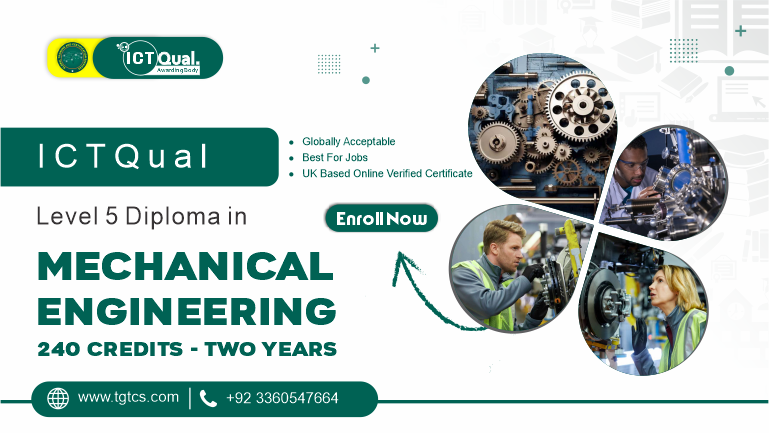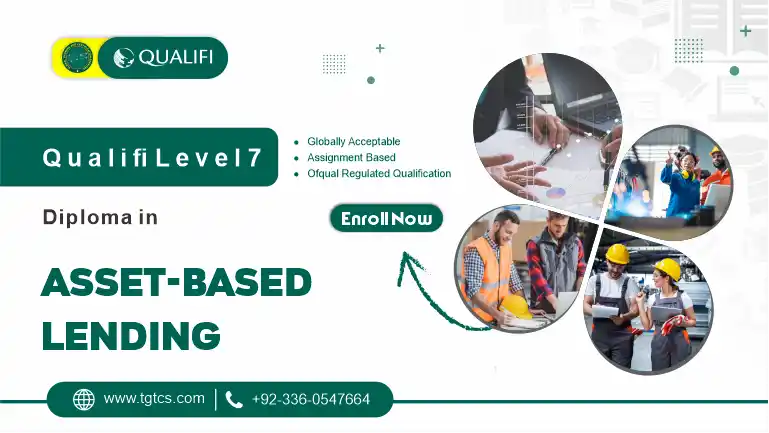ICTQual Level 5 Diploma in Mechanical Engineering 240 Credits-Two Years
The ICTQual Level 5 Diploma in Mechanical Engineering is a comprehensive two-year program designed to equip you with the technical expertise, practical skills, and problem-solving abilities needed to succeed in the mechanical engineering industry. With a total of 240 credits, this course offers a perfect blend of theoretical knowledge and hands-on experience, setting you up for success in various engineering roles.
The ICTQual Level 5 Diploma in Mechanical Engineering is an advanced qualification aimed at students seeking to deepen their understanding of mechanical engineering principles while developing practical, industry-ready skills. The course spans two years and covers a wide array of topics, from thermodynamics and fluid mechanics to robotics, materials science, and engineering design. This diploma offers 240 credits, which can be used towards further study or professional certification.
The ICTQual Level 5 Diploma in Mechanical Engineering is the perfect course for those who are eager to take their engineering career to the next level. With a comprehensive curriculum, practical experience, and global recognition, this qualification equips you with the skills and knowledge necessary to thrive in the dynamic field of mechanical engineering.
The Global Training and Certification Services (TGTCS) is Directly Approved Training Centre of ICTQual
The ICTQual Level 5 Diploma in Mechanical Engineering is a comprehensive two-year program designed to provide students with the knowledge and skills necessary for a successful career in mechanical engineering. With 240 credits, this qualification covers a wide range of topics, including engineering principles, thermodynamics, fluid mechanics, materials science, CAD, and control systems. The course blends theoretical learning with hands-on practical experience, preparing students for roles in industries such as aerospace, automotive, manufacturing, and robotics.
Upon completion, graduates are well-equipped to pursue various career paths, including positions as mechanical engineers, design engineers, project engineers, and manufacturing engineers. The diploma also opens opportunities for further study and professional certification, such as Chartered Engineer (CEng) status. This course offers a solid foundation for those looking to excel in the evolving and dynamic field of mechanical engineering.
Mandatory Units
The Units of Level 5 Diploma in Mechanical Engineering 240 Credits-Two Years are as :
Year 1 (120 Credits)
- Introduction to Mechanical Engineering
- Engineering Mathematics
- Physics for Engineers
- Engineering Materials
- Technical Drawing and CAD
- Thermodynamics
- Mechanics of Solids
- Fluid Mechanics
- Health and Safety in Engineering
- Introduction to Manufacturing Processes
- Electrical and Electronics Fundamentals for Engineers
- Communication and Professional Skills
Year 2 (120 Credits)
- Advanced Thermodynamics
- Mechanics of Machines
- Engineering Design and Analysis
- Computer-Aided Engineering (CAE)
- Automation and Control Systems
- Renewable Energy Systems
- Heat Transfer Applications
- Dynamics of Machinery
- Advanced Manufacturing Processes
- Robotics and Mechatronics
- Engineering Project Management
- Capstone Project in Mechanical Engineering
Year 1: Foundation and Core Knowledge (120 Credits)
- Engineering Mathematics
Apply advanced mathematical techniques such as calculus, linear algebra, and differential equations to solve mechanical engineering problems. Develop proficiency in mathematical modeling and analysis essential for designing and evaluating mechanical systems. - Mechanics of Materials
Analyze the behavior of materials under different loading conditions, including stress, strain, and deformation. Understand elasticity, plasticity, and failure criteria, applying these principles to solve real-world mechanical challenges. - Thermodynamics
Comprehend and apply the laws of thermodynamics, including energy conservation, enthalpy, and entropy, to mechanical systems. Solve thermodynamic cycles (e.g., Carnot cycle) related to engines, refrigeration, and power generation. - Fluid Mechanics
Apply principles of fluid statics and dynamics to analyze fluid flow in pipes, ducts, and open channels. Utilize Bernoulli’s equation and other fluid dynamics concepts to solve problems related to flow rate, pressure, and velocity. - Materials Science
Understand the structure-property relationships of engineering materials such as metals, polymers, and composites. Evaluate material selection based on mechanical properties, environmental conditions, and manufacturing processes. - Mechanical Drawing and CAD (Computer-Aided Design)
Create accurate technical drawings and 3D models for mechanical components and systems using CAD software. Apply engineering drawing standards, including dimensioning, tolerancing, and assembly drawings to communicate design intent effectively. - Manufacturing Processes
Understand various manufacturing processes like machining, casting, welding, and additive manufacturing. Evaluate the impact of each process on material properties and part geometry, selecting the best techniques based on cost, quality, and product requirements. - Engineering Mechanics
Analyze static and dynamic systems, applying Newton’s laws of motion, force analysis, and equilibrium conditions. Solve problems involving forces, moments, and stress analysis in mechanical structures and components. - Control Systems
Understand the fundamentals of control theory, including feedback loops, stability, and performance. Design and analyze simple control systems for mechanical applications using tools like block diagrams and transfer functions. - Health, Safety, and Environment in Engineering
Identify and assess health and safety risks in mechanical engineering processes and environments. Implement safety protocols and environmental sustainability practices to minimize hazards in engineering projects.
Year 2: Advanced Applications and Specialization (120 Credits)
- Advanced Engineering Mathematics
Apply advanced mathematical methods, such as partial differential equations and numerical analysis, to solve complex mechanical engineering problems. Model and solve real-world engineering systems with high precision. - Dynamics and Vibration Analysis
Analyze and model dynamic systems, including oscillations, resonance, and damping. Apply vibration analysis techniques to optimize designs and minimize vibrations in mechanical components and structures. - Engineering Materials and Processes
Evaluate advanced engineering materials, such as composites and high-performance alloys, along with their manufacturing processes and applications. Select appropriate materials for various mechanical applications considering properties, cost, and environmental impact. - Finite Element Analysis (FEA)
Use Finite Element Analysis (FEA) software to simulate and analyze stress, strain, and deformation in mechanical components and systems. Interpret FEA results to optimize designs and ensure safety, durability, and efficiency. - Mechanical System Design
Design complex mechanical systems by integrating engineering principles, material selection, and manufacturing processes. Ensure designs meet functional, safety, and cost requirements through systematic and innovative approaches. - Power Transmission Systems
Analyze and design mechanical systems used for power transmission, such as gears, belts, pulleys, and shafts. Understand key principles like torque, efficiency, and load distribution for effective power transfer. - Refrigeration and Air Conditioning Systems
Study the thermodynamic principles behind refrigeration and air conditioning systems. Design and analyze systems for cooling, heating, and temperature control, considering energy efficiency and environmental impact. - Project Management in Engineering
Develop project management skills, including planning, risk assessment, resource management, and budgeting. Utilize project management tools and techniques to successfully oversee engineering projects from inception to completion. - Advanced Fluid Mechanics
Analyze complex fluid systems, including compressible flow, turbulence, and non-Newtonian fluids. Apply these concepts to systems such as pumps, turbines, and heat exchangers to solve advanced fluid dynamics problems. - Sustainable Engineering
Integrate sustainability principles into mechanical engineering designs by choosing eco-friendly materials and energy-efficient technologies. Analyze product lifecycles to reduce waste, enhance energy efficiency, and minimize environmental impact. - Mechanical Testing and Quality Assurance
Understand and apply mechanical testing methods such as tensile, impact, and fatigue testing to ensure that materials and components meet industry standards. Implement quality assurance protocols to monitor and improve the quality of mechanical products throughout the design and manufacturing processes. - Mechatronics
Combine mechanical, electrical, and computer systems in the design of automated systems and robots. Apply mechatronic principles to develop smart machines and control systems for use in manufacturing and industrial automation. - Engineering Optimization Techniques
Apply optimization techniques, including linear programming, genetic algorithms, and multi-objective optimization, to improve mechanical system performance. Use these methods to solve design challenges related to cost, material usage, and efficiency. - Capstone Project/Engineering Research
Undertake independent research or work on a practical engineering project, applying the knowledge and skills acquired during the course. Develop a comprehensive engineering solution, from design and analysis to testing and evaluation, and present your findings through professional reports and presentations.
This curriculum provides a structured pathway from foundational concepts to advanced applications, ensuring that graduates are equipped with the knowledge and practical skills to excel in the mechanical engineering field. Whether you aim to become a mechanical engineer, project manager, or specialist in areas like fluid mechanics, mechatronics, or sustainable engineering, this program lays a solid foundation for your career growth.
The ICTQual Level 5 Diploma in Mechanical Engineering provides students with a comprehensive foundation in mechanical engineering, preparing them for a wide range of career opportunities in various industries. Here are the key benefits of pursuing this qualification:
- In-depth Knowledge and Skills
This diploma equips students with essential theoretical knowledge and practical skills in key areas such as thermodynamics, fluid mechanics, mechanics of materials, control systems, and mechanical system design. Students gain proficiency in using advanced mathematical and analytical tools to solve real-world engineering problems, preparing them for complex challenges in mechanical engineering. - Hands-on Experience with Modern Tools and Technologies
The program incorporates practical training with industry-standard software like CAD (Computer-Aided Design), FEA (Finite Element Analysis), and project management tools. Students also engage in hands-on learning through the study of manufacturing processes, control systems, and mechanical testing, ensuring they are well-versed in both design and practical applications. - Versatile Career Opportunities
Graduates of the ICTQual Level 5 Diploma are well-positioned for careers in multiple sectors, including automotive, aerospace, manufacturing, robotics, and energy. The program prepares students for roles such as mechanical engineer, design engineer, manufacturing engineer, project manager, and systems designer, allowing for a diverse range of career paths. - Foundation for Further Study and Professional Growth
This qualification serves as a stepping stone for further education in mechanical engineering or related fields. Graduates can pursue specialized qualifications, certifications, or advanced degrees to deepen their expertise. Additionally, the diploma provides the foundational knowledge needed to work toward professional recognition, such as becoming a Chartered Engineer (CEng) through industry bodies like the Institution of Mechanical Engineers (IMechE). - Specialized Knowledge in Emerging Fields
The curriculum includes emerging and highly relevant fields like mechatronics, sustainable engineering, and advanced fluid mechanics. Graduates will be equipped with the knowledge to design automated systems, optimize mechanical processes, and integrate sustainable practices in their engineering designs, ensuring they are at the forefront of industry innovations. - Emphasis on Problem-Solving and Innovation
Students are encouraged to think critically and creatively to solve engineering problems. The course includes a capstone project where students can apply their knowledge to a real-world problem, demonstrating their ability to innovate and develop practical solutions. This fosters not only technical skills but also creativity and critical thinking, which are vital in the engineering field. - Project Management Skills
The program includes project management modules, giving students the ability to oversee engineering projects effectively. Skills such as budgeting, scheduling, risk management, and resource allocation will be developed, ensuring graduates are well-prepared for leadership and managerial roles in their careers. - Global Career Prospects
Mechanical engineering is a globally recognized discipline, and the ICTQual Level 5 Diploma opens doors to international career opportunities. Graduates can pursue roles in engineering firms and manufacturing companies around the world, as the qualification is often recognized internationally. The versatility of mechanical engineering also allows graduates to work on large-scale projects across various regions and industries. - Sustainability Focus
The diploma includes courses that emphasize sustainable engineering practices, such as the use of eco-friendly materials, energy-efficient technologies, and the analysis of product lifecycles. This sustainability focus ensures that graduates are well-equipped to address global challenges related to environmental conservation and resource management. - Pathway to Entrepreneurship
For those with an entrepreneurial mindset, the diploma offers the knowledge needed to start a career in business. Graduates can establish their own mechanical engineering consultancy, develop innovative products, or start a company focused on mechanical systems design or manufacturing, with the foundation provided by the course.
In conclusion, the ICTQual Level 5 Diploma in Mechanical Engineering offers comprehensive training that blends theoretical understanding, practical skills, and specialized knowledge, preparing graduates for success in the rapidly evolving field of mechanical engineering. Whether you’re aiming for a career in engineering design, project management, or entrepreneurship, this diploma provides the tools and opportunities necessary to succeed.
The ICTQual Level 5 Diploma in Mechanical Engineering is designed for a wide range of individuals who are passionate about pursuing a career in mechanical engineering or advancing their existing engineering knowledge. The ideal learner for this course is someone who:
- Has a Strong Interest in Engineering
The ideal learner is someone with a deep interest in the principles and applications of mechanical engineering. They should be fascinated by how mechanical systems work and have a passion for solving real-world engineering challenges through design, analysis, and innovation. - Possesses a Solid Foundation in Science and Mathematics
As the course includes advanced topics like thermodynamics, fluid mechanics, and materials science, a strong background in mathematics and physics is crucial. Learners should be comfortable with mathematical concepts such as calculus, algebra, and differential equations, as these skills will be essential for solving complex engineering problems. - Aspires to a Career in Engineering
The ideal learner is someone who seeks to build a career in mechanical engineering or a related field, such as automotive, aerospace, robotics, or manufacturing. They are driven to contribute to the development of innovative solutions and systems that improve everyday life, industries, and technologies. - Is Motivated to Develop Practical Engineering Skills
This course is ideal for learners who want to gain hands-on experience with tools and technologies like CAD software, Finite Element Analysis (FEA), and various manufacturing techniques. The ideal student should be eager to apply theoretical knowledge to practical, real-world applications and engage in practical projects that simulate actual engineering work. - Has Problem-Solving and Critical Thinking Abilities
Mechanical engineering often involves solving complex and multifaceted problems. The ideal learner should enjoy analytical thinking, breaking down challenges into manageable components, and developing innovative solutions using scientific and engineering principles. - Is Interested in Sustainability and Innovation
With growing emphasis on sustainability in engineering, the ideal learner should have an interest in sustainable practices, energy-efficient technologies, and the development of environmentally friendly systems. They should be motivated to design solutions that balance technological advancement with environmental responsibility. - Has Strong Communication and Teamwork Skills
Engineering projects often require collaboration among professionals from different disciplines. The ideal learner should possess good communication skills, both written and verbal, to express ideas clearly and work effectively in team settings. This is especially important when discussing technical concepts, presenting designs, and working on collaborative projects. - Wants to Pursue Further Study or Professional Development
The ICTQual Level 5 Diploma in Mechanical Engineering is an ideal starting point for learners who want to progress further in their education or career. The ideal student should be motivated to pursue higher qualifications, such as a Bachelor’s degree in mechanical engineering or professional certifications (e.g., Chartered Engineer status). - Is Ready for a Challenging and Rewarding Journey
This course is rigorous and requires a strong work ethic, determination, and focus. The ideal learner should be committed to learning, willing to dedicate time and effort to mastering complex engineering concepts, and excited by the prospect of overcoming challenges to develop advanced skills. - Aspires to Leadership or Entrepreneurial Roles
The program is also well-suited for individuals who aim to take on leadership roles or start their own businesses in the field of mechanical engineering. Whether aspiring to be a project manager, an entrepreneur, or a leader in innovation, the ideal learner should be eager to gain the skills and knowledge necessary to succeed in management or to establish their own engineering consultancy or business.
In summary, the ideal learner for the ICTQual Level 5 Diploma in Mechanical Engineering is someone who is passionate about mechanical systems, possesses a solid foundation in science and mathematics, is committed to learning, and is motivated by a desire to innovate, solve complex problems, and contribute to the advancement of engineering technology.
The ICTQual Level 5 Diploma in Mechanical Engineering offers a solid foundation for students looking to further their education or advance their careers in the engineering field. Upon successful completion of the course, a variety of progression routes are available:
1. Higher Education (Bachelor’s Degree)
Graduates of the Level 5 Diploma can progress to a Bachelor’s Degree in Mechanical Engineering or a related field at a university or higher education institution. This opportunity allows students to deepen their technical knowledge, specialize in areas such as aerospace, automotive, or robotics, and obtain a degree highly valued by employers. Many universities offer direct entry into the second or third year of a bachelor’s program for students holding a Level 5 qualification.
2. Engineering Certifications and Professional Development
Graduates can pursue additional professional certifications to specialize in specific areas of mechanical engineering. Industry-recognized certifications from bodies like the Institution of Mechanical Engineers (IMechE) can enhance career prospects. Achieving Chartered Engineer status (CEng) can unlock more senior roles in engineering design, project management, and consultancy.
3. Employment in Mechanical Engineering Roles
The Level 5 Diploma provides graduates with the practical skills needed to enter various roles in the mechanical engineering field, including:
- Mechanical Design Engineer
- Manufacturing Engineer
- Product Development Engineer
- Maintenance Engineer
- Energy Engineer
- Control Systems Engineer
These positions are available in sectors such as automotive, aerospace, energy, manufacturing, and robotics.
4. Apprenticeship and Industry-Specific Training
For those who want to continue learning while gaining hands-on experience, apprenticeships or industry-specific training programs can be an excellent choice. Many organizations offer apprenticeships leading to further qualifications or specialized training in sectors like automotive engineering, aerospace, automation, or industrial systems.
5. Postgraduate Studies (Master’s Degree or MSc)
After completing the Level 5 Diploma, students can continue their studies by pursuing Master’s-level qualifications such as a Master of Science (MSc) in Mechanical Engineering. Postgraduate studies allow for deeper specialization in areas like nanotechnology, robotics, renewable energy, automotive systems, and advanced materials, further enhancing career prospects and preparing graduates for leadership roles in research and development.
6. Entrepreneurship and Startups
Graduates may choose to embark on entrepreneurial ventures, such as launching their own engineering-related businesses in product design, manufacturing, or consultancy. The knowledge and skills gained during the course, particularly in project management, materials science, and manufacturing processes, provide a solid foundation for starting an engineering-focused startup.
7. International Opportunities
With a Level 5 Diploma in Mechanical Engineering, graduates can explore global career opportunities, as mechanical engineering is a recognized field worldwide. Many countries highly value vocational and technical qualifications, and graduates may find exciting opportunities in industries such as construction, automotive, aerospace, and energy. This opens doors to career experiences and the possibility of relocating to engineering hubs around the world.
8. Research and Development (R&D)
Graduates can also pursue careers in research and development, contributing to the innovation of new technologies, materials, and systems. Companies in high-tech sectors like robotics, energy, and biomechanics highly value engineers who can drive advancements and push the limits of existing engineering practices.
The ICTQual Level 5 Diploma in Mechanical Engineering offers graduates diverse pathways for further education, specialization, and career progression. Whether continuing higher education, obtaining professional certifications, or entering the workforce directly, graduates are well-equipped to pursue successful careers in mechanical engineering and related industries.
Course Overview
Course Level
Level 5
Course Units
24 Mandatory Units
Duration
Two year






